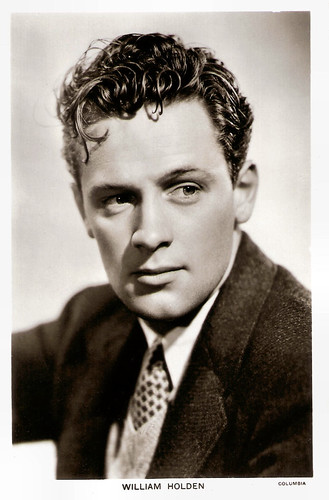
British postcard in the Picturegoer Series, London, no. 1377. Photo: Columbia.
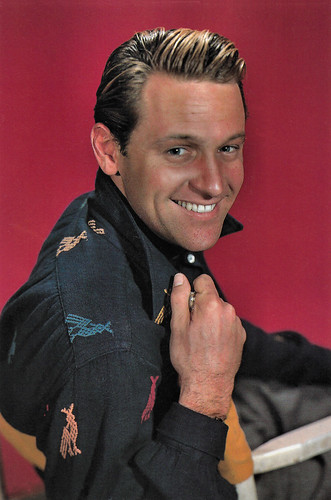
American postcard by Quantity Postcards, San Francisco, CA, no. OP 373, 1987.
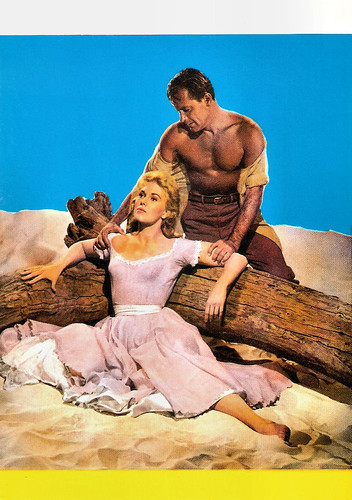
French postcard by Edition Erving, Paris, no. 757. Photo: Robert Coburn. Kim Novak and William Holden in Picnic (Joshua Logan, 1955).
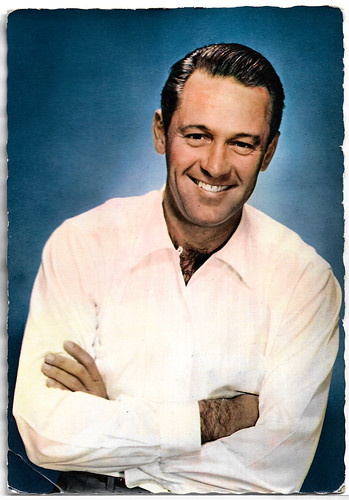
French postcard, no. 107.
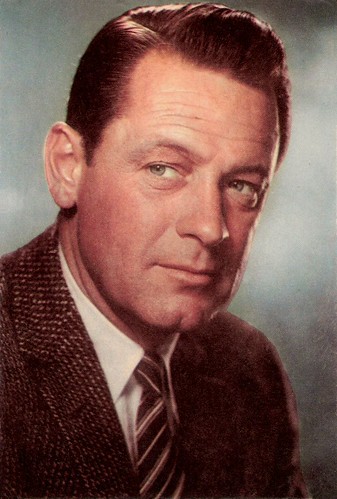
Belgian card by Cox, Import/Export, no. 36.
Golden boy
William 'Bill' Holden was born William Franklin Beedle Jr. in O'Fallon, Illinois, in 1918. Holden grew up in a wealthy family, which moved to Pasadena when Holden was three. His father, William Franklin Beedle, Sr., was an industrial chemist, head of the George W. Gooch Laboratories in Pasadena and his mother, Mary Blanche (Ball), a teacher.
His father, a keen physical fitness enthusiast, taught young Bill the art of tumbling and boxing. He went to study chemistry at Pasadena Junior College. A trip to New York and Broadway set Bill's path firmly toward an acting career. He had already performed in school plays and lent his voice to several radio plays in Los Angeles. When he played the part of octogenarian Eugene Curie at the Pasadena Workshop Theatre, he was spotted by a Paramount talent scout.
In 1938, he made his feature film debut with a role in Prison Farm. Having joined Paramount's Golden Circle Club of promising young actors, Bill was now groomed for stardom. However, it was a loan-out to Columbia that secured him his breakthrough role. He was the sixty-sixth actor to audition for the part of an Italian violinist forced to become a boxer in Golden Boy (Rouben Mamoulian, 1939) opposite Barbara Stanwyck and Adolphe Menjou. The picture was a minor hit and Columbia consequently acquired half his contract.
Since then, he was cast many times as the 'boy-next-door' or a rookie serviceman in pictures like Our Town (Sam Wood, 1940), I Wanted Wings (Mitchell Leisen, 1941) opposite 'peek-a-boo' star Veronica Lake, and The Fleet's In (Victor Schertzinger, 1942). His salary had been enhanced and he now earned $150 a week.
In July 1941, he married 25-year old actress Brenda Marshall, who commanded five times his income. In 1942, he enlisted in the Officers Candidate School in Florida, graduating as an Air Force second lieutenant. He spent the next three years on P.R. duties and making training films for the Office of Public Information. One of his brothers, a naval pilot, was shot down and killed over the Pacific in 1943.
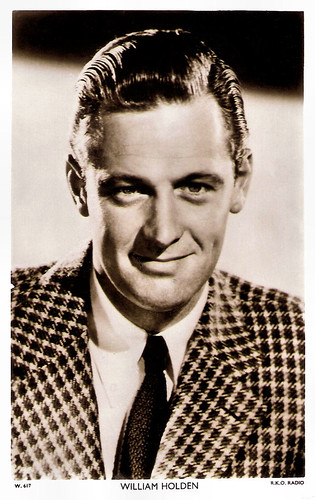
British postcard in the Picturegoer Series, London, no. W. 617. Photo: R.K.O. Radio.
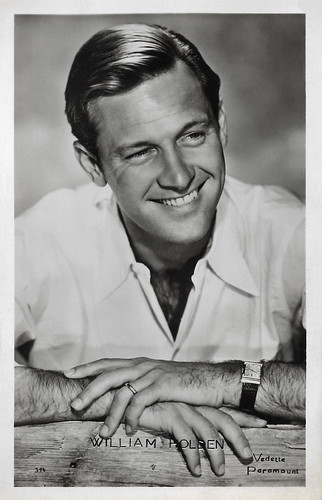
French postcard by Editions P.I., Paris, no. 394, offered by Hardy, France, "La vedette du Chocolat". Photo: Paramount, 1952.

Italian postcard by Grafica Fotocolor, Roma. Grace Kelly and William Holden in The Bridges at Toko-Ri (Mark Robson, 1954). Collection: Marlene Pilaete.
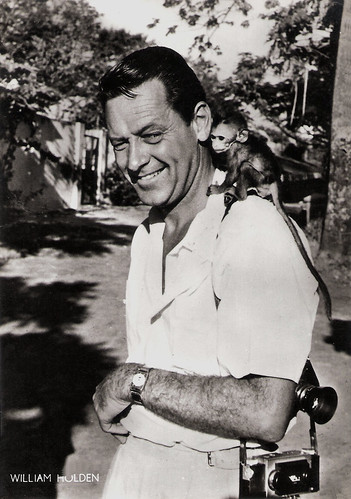
Italian postcard.
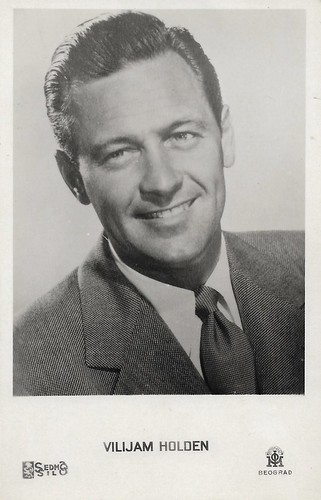
Yugoslavian postcard by Sedma Sila. Photo: IOM (Morava Film), Beograd (Belgrade).
One of the highest paid stars of the 1950s
After the war, William Holden got two very important roles. He played caddish, down-on-his-luck scriptwriter Joe Gillis in Sunset Blvd. (Billy Wilder, 1950) and a teacher in Born Yesterday (George Cukor, 1950). I.S. Mowis at IMDb: "Holden had effectively graduated from leading man to leading actor. No longer typecast, he was now allowed more hard-edged or even morally ambiguous roles."
His Oscar-winning role was that of a self-serving, cynical prisoner-of-war in Stalag 17 (Billy Wilder, 1953). Throughout the 1950s, Holden remained popular, thanks in part to films such as Sabrina (Billy Wilder, 1954) with Audrey Hepburn, The Bridges at Toko-Ri (Mark Robson, 1954), and Love Is a Many-Splendored Thing (Henry King, 1955).
In Picnic (Joshua Logan, 1955) he played an unemployed drifter who disrupts and changes the lives (particularly of the women) in a small Kansas town. Already one of the highest paid stars of the 1950s, Holden received 10% of the gross for The Bridge on the River Kwai (David Lean, 1957), making him an instant multi-millionaire. He invested much of his earnings in various enterprises, even a radio station in Hong Kong.
At the end of the decade, he relocated his family to Geneva, Switzerland, but spent more and more of his own time globetrotting. In the 1960s, Holden founded the exclusive Mount Kenya Safari Club with oil billionaire Ray Ryan and Swiss financier Carl Hirschmann. His fervent advocacy of wildlife conservation now consumed more of his time than his acting. His films, consequently, dropped in quality.
I.S. Mowis: "Drinking ever more heavily, he also started to show his age. By the time he appeared as the leader of an outlaw gang on their last roundup in Sam Peckinpah's The Wild Bunch (1969), his face was so heavily lined that someone likened it to "a map of the United States. He still had a couple more good performances in him", in The Towering Inferno (John Guillermin, 1974) with Paul Newman and Steve McQueen, and Network (Sidney Lumet, 1976) opposite Faye Dunaway. His last film was the excellent comedy S.O.B. (Blake Edwards, 1981) with Julie Andrews.
William Holden married actress Brenda Marshall in 1941, from whom he divorced in 1971. They had two children, born in 1943 (Peter) and 1946 (Scott). Holden also had a daughter, Virginia. She was not Holden's child, but he adopted her. Holden was good friends with fellow actor Ronald Reagan. In 1952, he and his wife were best men at the wedding of Reagan and Nancy Davis. However, he had no interest in politics. In 1981, William Holden died from a head injury caused by a fall. Holden had drunk too much and remained conscious for at least half an hour after his fall. He did not realise that he had to call an ambulance, otherwise, he would certainly have survived.
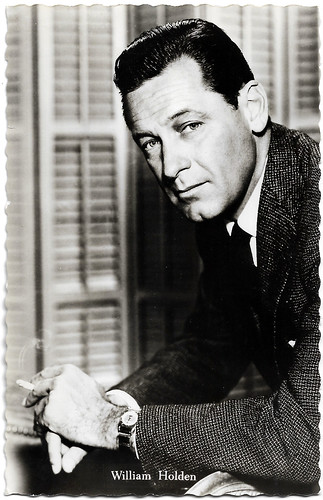
German postcard by Kolibri Verlag, Minden/Westf. Photo: Warner Bros. Collection: Geoffrey Donaldson Institute.
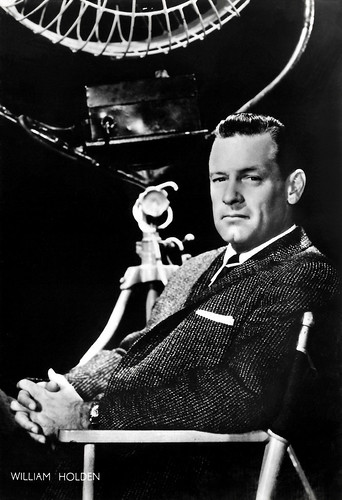
Italian postcard by Bromostampa, Milano, no. 323.
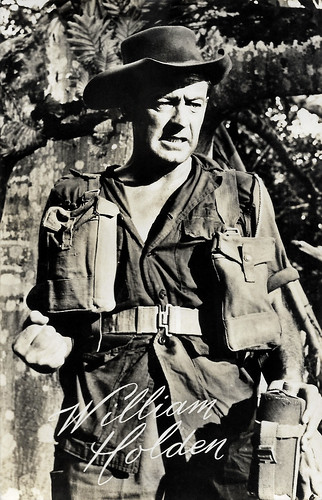
Dutch postcard by Uitg. Takken, Utrecht, no. 3805. Photo: Columbia. William Holden in The Bridge on the River Kwai (David Lean, 1957).
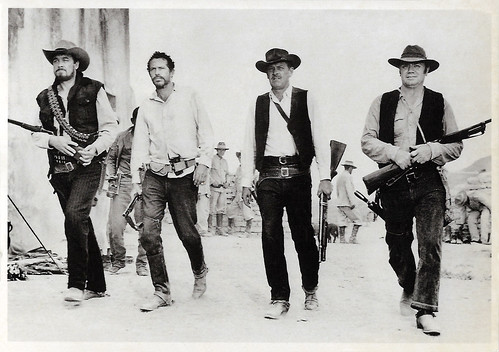
Canadian postcard by Canadian Postcard, no. A-40. Ben Johnson, Warren Oates, William Holden and Ernest Borgnine in The Wild Bunch (Sam Peckinpah, 1969).
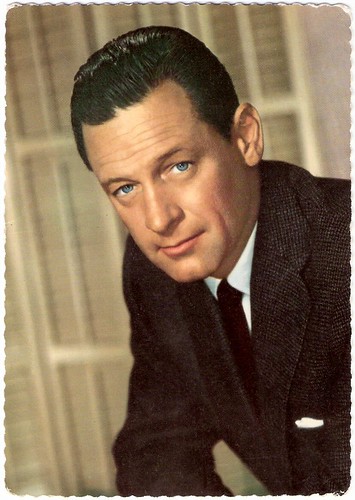
British postcard by D. Constance Ltd., London (Licence holder for Great-Britain of Ufa, Berlin-Tempelhof), no. CK-271.
Sources: I.S. Mowis (IMDb), Wikipedia (Dutch), and IMDb.
No comments:
Post a Comment